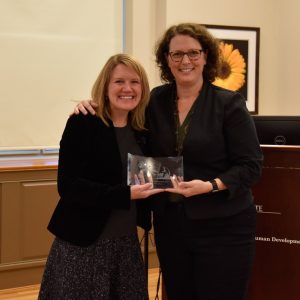
Mindfulness was the topic at hand for this year’s Bennett Lecture in Prevention Science, held on Oct. 15 in 110 Henderson Building. The Bennett Lecture is an annual fall eventhosted by the Edna Bennett Pierce Prevention Research Center. This year’s speaker, Katie Witkiewitz, professor of psychology at The University of New Mexico, gave a presentation to students, faculty, staff and community members titled “Mindfulness-Based Interventions for Addiction: Making a Better Band-Aid®.”
Building upon years of research beginning in the 1970s began by Alan Marlatt, who pioneered research in relapse prevention and harm reduction, Witkiewitz helped conduct the first study of using a Vipassana meditation course as a method for relapse prevention for individuals suffering from alcohol addiction and currently incarcerated in the early 2000’s. Vipassana meditation courses involves individuals meditating for several days of silence from morning until evening. The results of the study showed that after release, women who took the Vipassana meditation course were less depressed, less hostile, did not engage in as much substance use, and had lower rates of recidivism. However, after that first study, she shared that it was an uphill battle to obtain funding for a clinical trial of meditation as a treatment for addiction. After that, she and her colleagues decided to use the term “mindfulness-based relapse prevention” (MBRP) instead to reach a wider audience. She helped develop MBRP sessions with both formal and informal practices for clinicians to use with their patients.
“Relapse is the most common outcome following treatment for addiction. When I started my career as a young clinical psychology graduate student, I had a patient who I worked with to create a treatment plan for her alcohol dependence,” Witkiewitz said. “We worked with her for weeks to provide her coping skills and identifying her triggers. She wasn’t drinking, she was doing great. Then she had a hard week where she was meeting up with a friend who might encourage her to drink. And then she got fired from her job – that we didn’t see coming – and she relapsed. I remember being just devastated, and I know that this treatment was never going to be effective because I knew life was going to get in the way for other people.”
To date, Witkiewitz has conducted three randomized trials with community treatment agencies with hard-to-reach populations. She said that almost half to three-quarters of the respondents in the trials were engaging in mindfulness practices up to twelve months post-release from a community treatment facility. She noted that compared to gold standard relapse prevention treatment, MBRP does work to prevent relapse of alcohol or drug use.
“I think a lot of recovery work focuses on treatment that attempts to provide skills for increasing coping or directly targeting relapse. But it does not teach people coping skills or self-awareness to handle life situations that cause them to relapse in the first place. This is where mindfulness can come in and help give people the strength to deal with life,” she said.
Practicing mindfulness, according to Witkiewitz, involves observing ourselves and letting our minds wander in a non-judgmental space. She said the core of mindfulness for addiction is that whatever triggers people to use substances is not going to go away, so to instead hold onto that trigger in our awareness and in the present moment in a non-judgmental space.
“I think it’s important to stay with discomfort and really ‘be with’ daily joys and comforts. When you’re really being present in the moment, you bring awareness to yourself and respond in ways that serve us rather than react in detrimental ways,” she reiterated to the audience.
Witkiewitz conducted a second talk, “Alcohol Harm Reduction is Health Promotion: A 15-year Journey Examining Patterns and Predictors of Alcohol Treatment Outcomes,” at the Pasquerilla Spiritual Center on Oct. 16, as part of the Child Study Center speaker series. She discussed how abstinence from alcohol is often viewed as the most desirable and ideal outcome for individuals with alcohol use disorder; however, most individuals with alcohol use disorder do not want to abstain from drinking and do not seek treatment. She explained that reductions in drinking are a viable alternative to abstinence as a harm reduction strategy and are a significant public health priority.
Witkiewitz is a licensed clinical psychologist and has worked extensively on the development of a theoretical model of biopsychosocial influences on substance use relapse. She has been conducting research examining patterns and predictors of alcohol use since 1998 and has recently been working to improve research and methodological practices in the study of alcohol treatment outcomes. To date, she has written 5 books and over 190 peer-reviewed publications and book chapters, and she has given over 75 presentations and invited talks. Her research has been supported by grants from the National Institute on Mental Health, the National Institute on Drug Abuse, the National Institute on Alcohol Abuse and Alcoholism, and the National Center for Complementary and Integrative Health, totaling more than $22 million in research funding since 2004.
A recording of the talk is also available on YouTube.